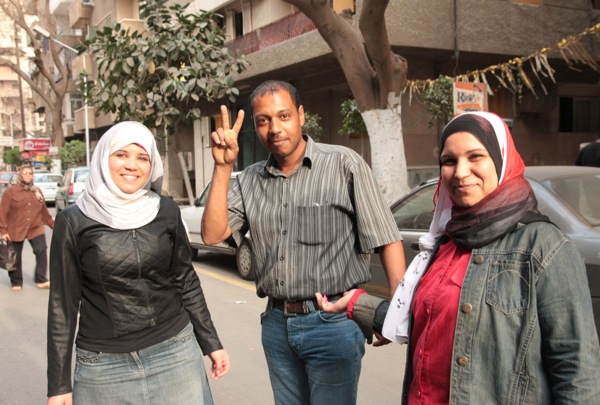You are here
 When I moved to Egypt to study
Arabic in 2004, I was amazed how often Muslims there said alhamdulillah (i.e., praise God). When I asked
friends “How are you?”, they replied alhamdulillah (praise God). When I congratulated Mahmoud’s children for
their high marks in school, they replied alhamdulillah. Even when Haala cut her hand deeply with a sharp
kitchen knife, she repeated steadily alhamdulillah, alhamdulillah, alhamdulillah, as we worked to stop the
bleeding. To my amazement, she was genuinely thankful, mindful her
accident could have been much worse. Naturally, I was hardly surprised to read replies from friends in
Egypt to whom I'd sent text messages of congratulations regarding their recent liberation from Hosni Mubarak. They
responded simply, alhamdulillah.
When I moved to Egypt to study
Arabic in 2004, I was amazed how often Muslims there said alhamdulillah (i.e., praise God). When I asked
friends “How are you?”, they replied alhamdulillah (praise God). When I congratulated Mahmoud’s children for
their high marks in school, they replied alhamdulillah. Even when Haala cut her hand deeply with a sharp
kitchen knife, she repeated steadily alhamdulillah, alhamdulillah, alhamdulillah, as we worked to stop the
bleeding. To my amazement, she was genuinely thankful, mindful her
accident could have been much worse. Naturally, I was hardly surprised to read replies from friends in
Egypt to whom I'd sent text messages of congratulations regarding their recent liberation from Hosni Mubarak. They
responded simply, alhamdulillah.
The Bible teaches us to thank God in all circumstances (1 Thessalonians 5:18, Psalm 34:1, Hebrews 13:15), but I have never witnessed a society actually doing this until I moved to Egypt. Immersed in a culture offering continual praise to God for all things, I enjoyed doing the same and was determined to continue after returning to the US in 2007.
Back in the US, however, I quickly sensed how uneasy many Americans became when I said alhamdulillah. Foreign terms can naturally be mysterious to all, but frequent mention of “Allah” can be particularly unsettling in a climate where Islam is widely misunderstood. Unaware that Arab Christians and the Arabic Bible also refer to God as Allah , some American Christians looked at me with particular concern. Although the Bible clearly states all nations will one day praise God in all languages—Arabic doubtless included (Revelations 7:9–10, Isaiah 45:23, cf. Acts 2:11)—I soon realized that most Americans would be far more comfortable if I praised God in English.
U nfortunately, saying praise God in English wasn’t quite the same. Judging by reactions, it seemed virtually void of shared meaning, even cliché. Some Christians looked at me as though I was being overly religious. Others appeared to presume I must be one of those strange, fundamentalist, Bible thumpers. At first I hoped I might be able to pass on to fellow Christians in the US what I learned from Muslims in Egypt so they too could begin to praise God continually, as the Bible commands.
As time went on, however, the American context made this more difficult than I imagined. While I certainly praise God more today than I did before moving to Egypt, I noticed increasingly that I began to praise God silently—in order not to appear holier than thou or offend. My praise reverted to silence because, I believe, continuous praise to God is so foreign to the US context. For example, if I began praising God when injured or suffering from pain as Haala did, I suspect even many devout Christians in America might think I’m crazy, no matter what the Bible commands. There are contexts in which my Christian community in California praises God frequently, but these tend to be private and limited to gatherings of like-minded believers. By contrast, no one in Egypt bats an eye when God is praised in any circumstance. Such praise has thoroughly permeated Egyptian culture to be completely normal.
As Philologos points out in The Jewish Daily Forward , observant Jews, especially the orthodox, make frequent use today of a parallel expression barukh ha-shem (blessed is God): “And by itself, without anything preceding it, barukh ha-shem is, just like [al]hamdillah , the standard response to being asked how you or anyone in your family is doing or feeling.” He adds that while Christians praise God with their own phrases, even “the most fervent Christian believer does not—and as far as I know, never did historically—resort to such expressions routinely when talking about almost anything.” Outside of earliest Christianity, which was completely Jewish, I would have to agree.
But if it is normal for Muslims and observant Jews to praise God continually in all circumstances, one wonders how the practice of Christians became so different, especially given our Jewish roots, and the explicit command of the New Testament,
“ … give thanks in all circumstances, for this is God’s will for you in Christ Jesus.” 1 Thessalonians 5:18
Years ago, I thought it both strange and ironic that I could learn to be a better Christian by looking at the example of devout Muslim and Jewish friends. Today, I can hardly keep track of how my own faith is illuminated by meaningful encounters with them. While significant differences remain, and it does not help us build bridges of understanding to act as if they don’t, I remain thankful for the way they have helped me read my Scriptures more consistently from the Middle Eastern context in which they emerged. So I remain determined to continually declare alhamdulillah and barukh ha-shem!
Theme by Danetsoft and Danang Probo Sayekti inspired by Maksimer



